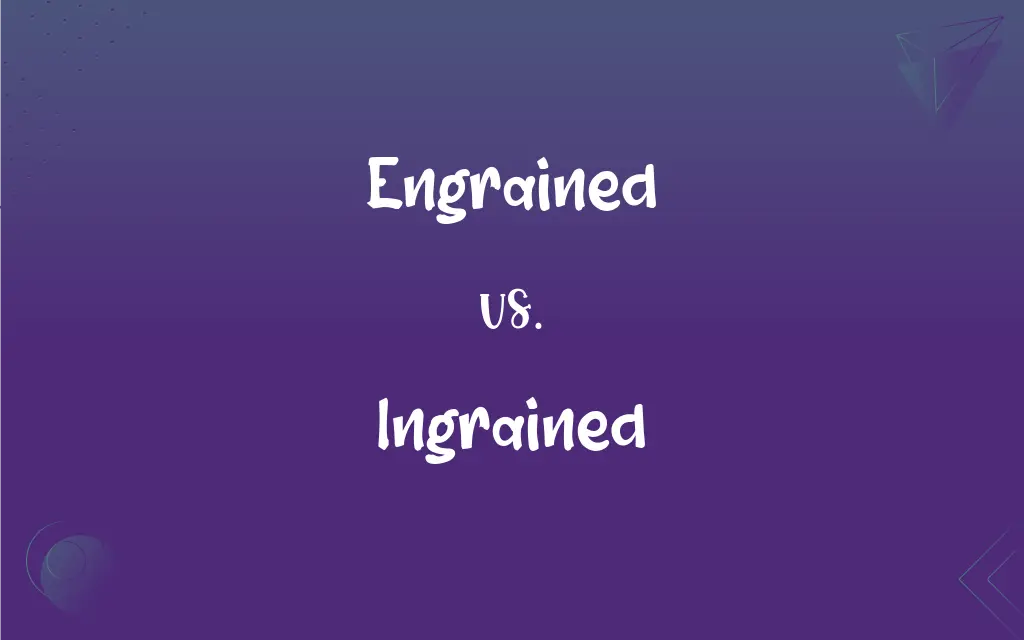Engrained vs. Ingrained: What's the Difference?
By Aimie Carlson & Harlon Moss || Updated on March 4, 2024
Engrained is often used incorrectly for ingrained, which describes something deeply rooted or firmly established in a person's beliefs or habits.

Key Differences
Engrained, though less commonly used, sometimes appears in contexts implying something is deeply embedded or fixed, typically in a physical sense. In contrast, ingrained is primarily used to describe attitudes, beliefs, or habits that are deeply rooted within a person's mind or character, often to the point of being difficult to change.
Engrained might occasionally be seen in literature or older texts, where it can be used to convey a sense of something being dyed, stained, or imprinted in a very permanent way. On the other hand, ingrained is more universally recognized in discussions about psychological or societal patterns, indicating how certain behaviors or ideologies become so deeply embedded in individuals or cultures that they seem almost natural.
The use of engrained is often considered a misspelling or misuse by many language purists and style guides, which prefer ingrained for expressing the idea of deeply set characteristics or qualities. Whereas, ingrained is widely accepted and utilized across various forms of discourse, emphasizing its relevance in describing enduring traits or qualities.
In some contexts, engrained may be chosen for its phonetic or stylistic qualities, perhaps to evoke a particular feeling or imagery. Meanwhile, ingrained is selected for clarity and precision in conveying the deep-seated nature of something, whether it be a personal conviction or a habitual action.
Despite their differences in usage, both terms share a common root in the idea of being firmly established or fixed. However, ingrained holds a more significant place in contemporary language, embodying the concept of something that has become a fundamental part of one's psyche or social fabric.
ADVERTISEMENT
Comparison Chart
Context
Sometimes used in physical senses
Common in psychological contexts
Language Evolution
Less common, older usage
Widely accepted and used
Connotation
Physical embedding or staining
Deeply embedded habits or attitudes
Examples of Use
"The dirt was engrained in the fabric."
"Her principles are ingrained in her character."
Engrained and Ingrained Definitions
Engrained
Rarely used in modern language.
Engrained habits is less common than ingrained habits.
ADVERTISEMENT
Ingrained
Part of one's inherent characteristics.
His ingrained sense of loyalty made him a trusted friend.
Engrained
Deeply embedded in a physical context.
The mud was engrained in the grooves of his boots.
Ingrained
Pertaining to something absorbed into the very nature of something or someone.
The ingrained traditions of the festival are celebrated annually.
Engrained
Related to being stained or dyed.
The color was engrained into the wood.
Ingrained
Deeply rooted in one's personality or habits.
Honesty is ingrained in her nature.
Engrained
Used to mean deeply rooted.
The typo is engrained in the text.
Ingrained
Hard to change or remove.
The ingrained prejudice in the community was difficult to overcome.
Engrained
Implied permanence in a physical attribute.
The scar was engrained across his face.
Ingrained
Reflected in deeply held beliefs.
Her feminism is ingrained in her writings.
Engrained
To ingrain.
Ingrained
Firmly established, as by long conditioning; deep-seated
Ingrained prejudice.
The ingrained habits of a lifetime.
Engrained
Simple past tense and past participle of engrain
Ingrained
Worked deeply into the texture or fiber
A carpet disfigured by ingrained dirt.
Ingrained
Being an element; present in the essence of a thing
Ingrained
Fixed, established
Ingrained
Simple past tense and past participle of ingrain
Ingrained
(used especially of ideas or principles) deeply rooted; firmly fixed or held;
Deep-rooted prejudice
Deep-seated differences of opinion
Implanted convictions
Ingrained habits of a lifetime
A deeply planted need
FAQs
What does ingrained mean?
Ingrained describes something deeply rooted or established, especially in terms of habits, beliefs, or attitudes.
How can something become ingrained in a person?
Through repeated practice or exposure, beliefs or habits can become deeply embedded in a person's character or behavior.
Is engrained a correct spelling?
Engrained is often considered a misspelling of ingrained, but it can appear in certain contexts or older texts.
Is ingrained always negative?
No, ingrained traits can be positive, such as integrity or compassion, depending on the context.
Can engrained and ingrained be used interchangeably?
Generally, no. Ingrained is the correct term for describing deeply embedded traits or qualities, while engrained is less commonly used and sometimes regarded as incorrect.
Can physical objects be described as ingrained?
While physical objects can have ingrained dirt or patterns, the term is more commonly used for intangible qualities.
How does language influence the perception of terms like engrained and ingrained?
Language evolution and usage norms play a significant role in determining the preferred or accepted use of terms, impacting their perception.
What are examples of ingrained habits?
Examples include brushing teeth twice a day or always being punctual; these habits are so deeply rooted they become automatic.
How can one change an ingrained behavior?
Changing ingrained behavior often requires conscious effort, time, and sometimes professional help to alter deeply rooted habits.
What is the origin of the word ingrained?
It comes from the concept of dye being worked into the fabric so thoroughly that it cannot be removed, metaphorically applied to non-physical traits.
Why might someone intentionally use engrained instead of ingrained?
For stylistic reasons, to evoke a particular tone, or to reflect a specific dialect or period language.
In what contexts is engrained still used?
It is occasionally seen in literary or historical texts, or as a stylistic choice, though it is much less common than ingrained.
Can societal attitudes be ingrained?
Yes, societal attitudes and norms can become ingrained within a culture over time, influencing behaviors and perceptions.
How does one identify ingrained patterns in society?
Through observation, research, and analysis of cultural practices, norms, and values that are widely accepted and perpetuated over time.
Can technology have ingrained features?
Yes, certain features can be so fundamental to a technology's design or function that they are considered ingrained.
Does the use of engrained over ingrained indicate a lack of education?
Not necessarily; it may reflect a regional spelling preference or a misunderstanding of the preferred or more widely accepted term.
Is it possible to have ingrained skills?
Skills can become ingrained through practice, becoming second nature to the individual.
Is there a psychological aspect to ingrained behaviors?
Yes, psychological factors heavily influence the development of ingrained behaviors, often tied to reward systems or repeated exposure.
How do educators address ingrained misconceptions in students?
Through targeted instruction, providing evidence, and encouraging critical thinking to challenge and replace ingrained misconceptions.
Can ingrained habits be beneficial?
Absolutely, ingrained habits that promote health, efficiency, and positive social interaction are beneficial.
About Author
Written by
Aimie CarlsonAimie Carlson, holding a master's degree in English literature, is a fervent English language enthusiast. She lends her writing talents to Difference Wiki, a prominent website that specializes in comparisons, offering readers insightful analyses that both captivate and inform.
Co-written by
Harlon MossHarlon is a seasoned quality moderator and accomplished content writer for Difference Wiki. An alumnus of the prestigious University of California, he earned his degree in Computer Science. Leveraging his academic background, Harlon brings a meticulous and informed perspective to his work, ensuring content accuracy and excellence.































































